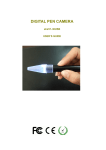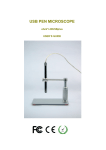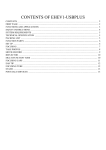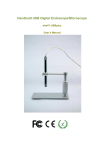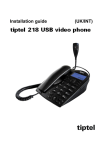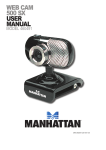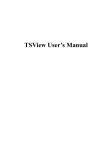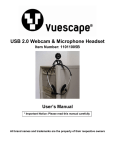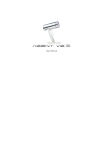Download manual
Transcript
DIGITAL PEN CAMERA eheV1-USB USER’S GUIDE Introduction Functions and applications The DIGITAL PEN CAMERA is a new electronic health care product for the home. It is a tubular imaging system consisting of an optical lens, an image sensor, an illumination mechanism, and an image transfer control circuit connected to a computer. You can display the images captured by the DIGITAL PEN CAMERA on the computer screen, store them on the computer, print them, or send them over the Internet. As an endoscope, you can use it to observe yourself like using a mirror. You can observe any part of your body, in particular the parts that you could not see before. Frequent observation and knowing what your body looks like in its normal, healthy state make you more alert to any abnormalities and will lead to early detection and treatment of illnesses. As a USB microscope, it can magnify stamps, coins, antiques, insects, electric circuits, machines, fabrics, food, decorations, etc. and can also help visually impaired patients magnify small text for reading. Attention Before installation and use of this product, please read the instructions in this manual to ensure its correct use. Safety instructions Before using this product, please carefully read the following safety instructions. 1. The socket that the computer is plugged in must be properly grounded, as the computer supplies power to this product. If in any doubt, please have a professional electrician check and verify the grounding to ensure safety. 2. Never use this product in stormy weather. 3. This product contains delicate and precision components. Be gentle when using it and avoid harsh handling or excessive force that may cause damage to the product. 4. The temperature of the handle increases slightly during use and it feels a little warm. This is normal. If the product is overheated and hot to the touch, immediately cut off the power and contact us for repair. 5. Never leave the product on unattended. Unplug from the USB port after use. 6. Do not disassemble this product. Disassembling this product will result in irreparable damage. The company is not responsible for damage resulting from disassembly of the product by the user. In case of any difficulties in using the product, please contact us. 7. This product may only be used by children under supervision of an adult. Never give this product to a child to use or play by him or herself. Keep this product out of reach of children. 8. Do not let this product come in direct contact with steam, vapor, water, or liquids of any kind. Such contact can cause irreparable damage that is not covered by warranty. 9. When not in use, put the handle in the transparent sleeve and store it in a tightly sealed box to avoid moisture and decay. Damages resulting from improper storage are not covered by the warranty. 10.When using this product for eye examination, the illumination should be as dim and the examination time as short as possible. Never use this product to examine the eyes of infants or young children. 11.Examination or cleaning of the ear canal, nasal cavity and oral cavity should only be undertaken by adults who have mastered the depth and force required for such a task. 12.Never use the mirror or cotton swab for cleaning or treatment of the deep rear part of the oral cavity. Parts may drop into the throat and cause serious damage. 13.The cable in this product have been strictly tested. To ensure safe use, do not replace it.. System Requirements For best picture quality, the following specifications are recommended: 1. IBM PC compatible computer 2. Intel Pentium III processor or above 3. 128M RAM or above 4. At least one USB port (For best effect, USB 2.0 port is recommended). 5. WinXP or Vista home edition or professional edition with CD-ROM and a 40G or higher hard disc. Technical Specifications 1. DSP: Vimicro Digital Image Monarch Processor. 2. Sensor: high-quality CMOS sensor, with software capable of static interpolation up to1.3 million pixels. 3. Resolution: 640×480 4. Colors: true color 24bit (RGB) 5. Interface: USB1.1/USB2.0. 6. Frame rate: 30 frames/sec (CIF and VGA). 7. Focal distance: 10mm - ∞ 8. Magnification: 40×.(at 10mm on 17” screen by 640 x 480 resolution) Digital Pen Camera Reflector with focusing ring Multi-function tube with focusing ring Ear tip with focusing ring Ear pick with focusing ring Large focusing cap Small focusing cap cable with light intensity control dial Software CD (User manual included) 1 1 1 1 1 1 1 1 1 Installation and set up To avoid mistakes in the installation process, please strictly follow these steps: install driver→ restart→ plug Digital PEN CAMERA into the USB port→ follow system prompts to complete the installation→ restart. Install driver (use WINXP as an example) > Place the included CD into the CD-ROM drive. > Find the folder of “DPC setup”. > Click “Setup.exe” and follow the prompts to complete installation. > Click “Complete”, and restart the system. >After restart is complete, plug the DIGITAL PEN CAMERA into the USB port, and the “New Hardware Guide” interface should pop up. Follow the prompts to complete installation. Set up procedure > Double click on the VIMICROCAM icon on your desktop and a window should appear as on the screen. > To adjust image quality, choose “Video capture filter” in the “OPTIONS” menu. We recommend selecting “default” to restore the image to the system-optimized quality. If operating under low-light conditions, select mode-controlled exposure mode to manually adjust and increase the brightness of the image. > To adjust image resolution, choose “Video capture pin” under the “OPTIONS” menu. Then select a desired image resolution in the pull-down menu. Click “Confirm” to complete. Directions for Use Properly connect the DIGITAL PEN CAMERA to the computer and to rotate the dial on the USB cable to controls the brightness of the LEDs on the DIGITAL PEN CAMERA. After a short while youu should see the image captured by the DIGITAL PEN CAMERA on the computer monitor. OPEN IMAGE WINDOW Double click on the icon and open an image window on the screen. After a few seconds the pen camera will begin to take still image in the window. Click on ‘OPTIONS’ and click on ‘VIDEO CAPTURE PIN’. Click one of image window size in the drop-down menu and click on ‘OK’ to confirm. FOCUSING Attach the focusing ring on any one of the parts to the front end of the DIGITAL PEN CAMERA. Make sure the focusing ring is properly connected to the lens. The four focusing rods inside the focusing ring should match up with and sit in the four hollows in the focusing plate on the surface of the lens. When the focusing ring is rotated the lens should rotate, thus adjusting the focus. Please pay attention to that every function part is the same way connection to the lens. TAKE PHOTOS Push the button of the dimmer that located on the USB cable to freeze an image. The photos you have taken will be saved in the computer and display an icon on the screen. LED Light Adjustment There is a LED light dimmer on the USB cable. User turn the dimmer can adjust the light power to a proper level according the demand of observation. MOVIE RECORD For making a record of still image please follow below procedures. 1, Click on the ‘capture’ that located on the top line of image window 2, Click on the ‘set time limit’ 3, Click on the ‘use time limit’ 4, Input the number of seconds that you want to delay the record 5, Click ‘ok’ to confirm 6, Click ‘capture’ again 7, Click ‘start capture’ 8, Click ‘ok’ to start the recoder The movie record will be stopped while time is off. The movie will be saved as the AVI format. REFLECTOR The reflector always comes with the focusing ring and it adjust focus same way with the other function parts. The focusing distance can be 10mm to infinity. For use on the teeth checking it should be focused on any surface that is at the distance of 10 to 15mm far from the reflector before it be used for teeth checking. MULTI-FUNCTION TUBE The multi-function tube adjust the focus the same way as the focusing ring and are used to focus on and inspect printed materials on every kind parts or flat surfaces. The advantage of using a multi-function tube is that it saves you from the need to constantly adjust the focus when you use the pen camera to view parts or flat surface materials and have to constantly move the camera. By attaching a multi-function tube to the pen camera, you can press the tube against the surface of the materials you want to view and thus always maintain a constant distance between the lens of the pen camera and the materials. With the multi-function tube, the distance between the lens of the camera and observed surface is about 25mm. To use the multi-function tube, focus on the edges of the opening at the front end of the lens. This is done by adjusting the focus until you see a sharp edged circle on the screen. The multi-function tube can now be used to inspect the ear canal, nasal cavity, hair roots, skin, etc. FOCUSING CAPS The focusing caps adjust the focus the same way as the focusing ring and are used to focus on and inspect printed materials on flat surfaces. The advantage of using a focusing cap is that it saves you from the need to constantly adjust the focus when you use the pen camera to view flat surface materials and have to constantly move the camera. By attaching a focusing cap to the pen camera, you can press the cap against the surface of the materials you want to view and thus always maintain a constant distance between the lens of the pen camera and the materials. The focusing caps come in large and small sizes. With the large focusing cap, the distance between the lens of the camera and observed surface is 20mm. With the small focusing cap, the distance between the lens of the camera and observed surface is 10mm. The large and small focusing caps are sold separately. Please order according to your need. EAR TIP The ear tip should be connected to the focusing ring, which is then connected to the front end of the handle. The four focusing rods inside the focusing ring should match up with and sit in the four hollows in the focusing plate on the surface of the lens. When the focusing ring is rotated the lens should rotate, thus adjusting the focus. To use the ear tip, focus on the edges of the opening at the front end of the lens. This is done by adjusting the focus until you see a sharp edged circle on the screen. The ear tip can now be used to inspect the ear canal, nasal cavity, hair roots, skin, etc. Focusing tube Focusing tube is used to touch the objectives that is watching and get a higher magnification. Tripod A tripod is come with the pen camera and for fixing the pen cam while you do not use it or use the pen cam as a PC camera. People studying microscopic morphology can use it to inspect jewelry, china, decorations, coins, antiques, fabrics, electric circuits, etc. Since the focus of the lens is at the edge of the front-end opening, you can see virtually anything you point at. At the same time you still can adjust the clarity of the image by rotating the focusing ring while viewing. While push down any one of the buttons on the handle the DIGITAL PEN CAMERA freeze a picture on the screen. The picture could be saved by common operation. Post-Sale Services Limitations and exclusions Please keep all the receipts of your purchase in a safe place. You need to produce the unaltered and original receipts to receive warranty coverage. Otherwise, the warranty is voided. The warranty only covers the product if it is used under normal operation conditions. However, the following are not covered by the warranty: Damages resulting from unauthorized disassembly or assembly of the products by the customer Damages caused by fitting of improper components to the product Damages resulting from unauthorized attempts to repair or to alter the product Gross distortion, scratches, discoloration, or damage of the covering Cracks, scratches, and mold spots on the lens. COMS sensor is burned or apparently scratched Damages to the PCB board (such as burned PCB board) due to misuse Repair Service Card Product model: Date of repair Customer’s phone number name Description of faults Place of repair Results Warranty Card Name of customer Address of customer Purchase date Customer phone number Product model Labeling of Sales Company Serial number













